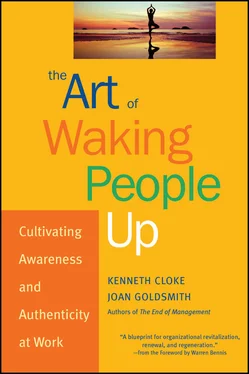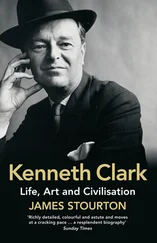ISBN 0-7879-6380-1 (alk. paper)
1. Mentoring in business. 2. Incentives in industry. 3. Organizational behavior.
I. Goldsmith, Joan. II. Title.
HF5385 .C54 2003
658.3'124—dc21
2002015466
FIRST EDITION
HB Printing 10 9 8 7 6 5 4 3 2 1
BOOKS BY KENNETH CLOKE AND JOAN GOLDSMITH
Thank God It’s Monday: 14 Values We Need to Humanize the Way We Work , Irwin/McGraw Hill, l997
Resolving Conflict at Work: A Complete Guide for Everyone on the Job , Jossey-Bass/Wiley, 2000
Resolving Personal and Organizational Conflicts: Stories of Transformation and Forgiveness , Jossey-Bass/Wiley, 2000
The End of Management and the Rise of Organizational Democracy , Jossey-Bass/Wiley, January 2002
BOOKS BY WARREN BENNIS AND JOAN GOLDSMITH
Learning to Lead: A Workbook on Becoming a Leader , Addison Wesley, 1997
BOOKS BY KENNETH CLOKE
Mediating Dangerously: The Frontiers of Conflict Resolution , Jossey-Bass/Wiley, 2001
Mediation, Revenge and the Magic of Forgiveness , Center for Dispute Resolution, Santa Monica, California, 1996
To our mothers, Shirley and Miriam, who encouraged us to wake up, be authentic, and express our values through our work .
About twenty years ago I wrote an article titled, with the poignance of a flower child, “Where Have All the Leaders Gone?” What I wonder about today is, Where will the leaders come from? Not too long ago, I did some pro bono consulting for an outstanding research center with a gazillion Nobel laureates on staff. Over the past few years they’ve had a lot of difficulty attracting and then holding on to leadership. The problem seemed simple yet intractable. Anybody who was good enough to pass the rigorous scientific criteria of the search committee didn’t want the job. They wanted to do science. Having served on dozens of search committees for academic deans and presidents, I know the same problem presents itself in many other forums. There is a genuine dearth of people who are accomplished in their disciplines and want to take on leadership and are competent at it. So every other year the aforementioned research institute, after a long, drawn-out process, hired some reluctant soul who, after a year or so, found out he really wanted to go back to his lab, and the search started all over again. Ad nauseam.
Recruiting and sustaining the most talented people possible is the first task of anyone who hopes to create a successful organization and deliver on its promise. The people who can achieve something truly unprecedented have more than enormous talent and intelligence. They have original minds. They see things differently. They can spot the gaps in what we know. They have a knack for discovering interesting, important problems as well as skill in solving them. They want to do the next thing, not the last one. They see connections. Often they have specialized skills, combined with broad interests and multiple frames of reference. They tend to be deep generalists, not narrow specialists. They are not so immersed in one discipline that they can’t see solutions in another. They are problem solvers before they are managers. They can no more stop looking for new relationships and better ways of doing things than they can stop breathing. They have the tenacity that is so important in accomplishing anything of value. And they are aware of what they are doing and bring an authenticity to the process.
Now what’s interesting about all this is that more and more of our workers are, to use Peter Drucker’s thirty-eight-year-old phrase, “knowledge workers.” And today I should add that more and more are “investor workers,” bringing their own profitable ideas into their companies. But where will leaders come from to run these new organizations, lead this emerging workforce, and deliver a viable new economy? What about the social contract between employers and employees, that hallowed implicit contract that usually offered some form of loyalty and responsibility to both parties? Roughly 25 percent of the U.S. workforce has been dumped since 1985 and even at present, when the unemployment rate is low, about 6 percent, you can figure on a half to three-quarters of a million employees in flux every year.
An interesting bit of data is that in 1998, about 750,000 workers were laid off or quit or retired, and of those, 92 percent found jobs that either paid more or were equal to what they had been getting. A recent survey reported in the Wall Street Journal revealed that four out of ten employees were less than three years in their job, only a third of the workforce works in an old-fashioned nine to five job, and the quit rate this year is 14.5 percent. Ten years ago it was about 3 percent. I figure that the chum of the workforce at any given time is between 20 and 25 percent; that is, the number of workers who are temporarily out of work or looking for new opportunities is roughly that figure. So what about the social contract, which in our “Temporary Society,” in our “Free Agency Society,” seems to be: “We’re not interested in employing you for a lifetime. . . . That’s not the way we’re thinking about this. It’s a good opportunity for both of us that is probably finite”? Is it all going to be many finite trips?
In light of this constant flux, organizations going for longevity need to discover continued sources of learning, growth, and revitalization. But how do we reach the next generation? Do we continue to do what we have been doing, with just a little bit more? Why fix what ain’t broken? The discrepancy between the promise of available talent and delivery on their potential raises questions we need to consider. Are we providing learning experiences that will build the cognitive, emotional, interpersonal, and leadership competencies that are required for sustained success in the “new economy”? Is there space in our clogged work lives for the philosophy, the metaphysics, the critical thinking of the enterprise? Are we giving our employees a passion for continual learning, a refined, discerning ear for the moral and ethical consequences of their actions, and an understanding of the purpose of work and human organizations?
It is an intense journey to achieve a positive sense of ourselves and to know our abilities and our limitations. We can get there by understanding what it takes for us to learn about ourselves: learning to solicit and integrate feedback from others, continually keeping ourselves open to new experiences and information, and having the ability to hear our own voice and see our own actions.
Is this a tall order for today’s organizations and their leaders? Not when we examine what’s at stake. As we face revelations of corruption and fraud in our workplaces; as we totter on the brink of economic instability, and swing from disillusion and cynicism to outrage and despair, the times call for us to wake up, call forth integrity, and have the courage to champion the dramatic changes we require.
Cloke and Goldsmith have created a blueprint for organizational revitalization, renewal, and regeneration. The direct, explicit, accessible strategies they prescribe will transform work environments into living, vital learning opportunities that challenge leaders on every level, from CEO’s and middle managers to team members and line workers, to apply their wisdom to the systems, structures, and day-to-day interactions of organizational life and better themselves, their experience of work, and their collaborative endeavors.
November 2002
WARREN BENNIS
Distinguished Professor of
Business Administration
University of Southern California
I have often thought that the best way to define a man’s character would be to seek out the particular mental or moral attitude in which, when it came upon him, he felt himself most deeply and intensively active and alive. At such moments, there is a voice inside which speaks and says, “This is the real me.”
Читать дальше











